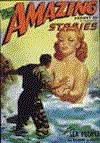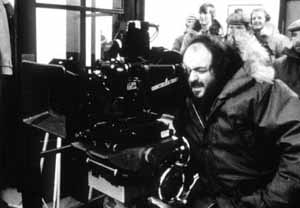|
|
|
Stanley Kubrick made science fiction respectable March 11, 1999 By Franklin Harris Respects have been paid from all quarters over the past several days. Actors Tom Cruise and Nicole Kidman, director Steven Spielberg, film critic Roger Ebert and science fiction author Arthur C. Clarke are among the many remembering one of the cinema's greatest artists. Stanley Kubrick's death at 70 early Sunday morning came as a shock. We had all come to think of the eccentric filmmaker as immortal.
More likely, however, he seems timeless because his films are timeless. In a career that spanned nearly 50 years, Kubrick directed only 16 films. He was known for his exacting standards. He could take two or three years on a single project. And he could shoot 100 or more takes of a single scene in his search for perfection. "Eyes Wide Shut," his last project completed only days before his passing, kept its stars, Cruise and Kidman, busy for over a year. Filmed in total secrecy, the film is scheduled for release this summer. Kubrick was a genius. My own favorite of his films is his dark, anti-war comedy "Dr. Strangelove" (1963). "Dr. Strangelove" was the finest moment of its star, Peter Sellers, who played three different roles, including the bizarre title character. And the film was also Kubrick's first real hit. But we will always remember Kubrick most for his 1968 masterpiece, "2001: A Space Odyssey." It is the film that made cinematic science fiction respectable. It isn't as if "2001" was the first serious science fiction film. "Forbidden Planet" and "The Day the Earth Stood Still" both showed that SF movies could be about more than mere bug-eyed monsters and improbable, Flash Gordon-style rocket ships. But "Forbidden Planet" and "The Day the Earth Still" each retained elements of 1950s matinee sci-fi. Both clung to the flying saucer as the principal method of space travel, and "The Day the Earth Stood Still" couldn't help but descend into juvenile moralizing. "2001" was the great breakthrough. Kubrick and Clarke labored four years to turn the latter's short story, "The Sentinel," into a motion picture. The result was a film that extrapolated from real-world science and technology. It heeded the laws of physics. And it avoided the clichés of its predecessors. "2001" is an easy film to appreciate and respect. It is shot with Kubrick's usual, obsessive detail. Its tale of human evolution, past and future, is timeless. And its real star, the neurotic, homicidal HAL 9000 computer (voiced by Douglas Rain), is one of science fiction's most memorable characters. It's no wonder the movie makes nearly everyone's list of the 10 best films of all time. But "2001" is a hard movie to like. Every time I watch it, I can't help but think it could only be improved by the trimming of 30 minutes. And if you try to think of the film's conclusion in literal rather than figurative terms, you're doomed to frustration. Of course, even Kubrick sometimes didn't like his own work. After "2001," Kubrick again tried his hand at SF. His next film was his 1971 adaptation of Anthony Burgess' novel, "A Clockwork Orange." In "A Clockwork Orange," Malcolm McDowell plays Alex, an amoral youth who spends his nights raping, pillaging and partaking in more than a little "ultra-violence." The point of the story is that society's attempts to combat evil -- in this case by brainwashing Alex -- sometimes are worse than the evil itself. But, in the end, Kubrick requested his movie be banned from the United Kingdom, his home since the early '60s, because of its extreme depictions of violence. "A Clockwork Orange" wasn't to be Kubrick's last attempt at genre filmmaking. After 1975's "Barry Lyndon," Kubrick returned to speculative fiction, helming an adaptation of Stephen King's novel, "The Shining." "The Shining" (1980) cemented Jack Nicholson's reputation and, like "2001" before it, contained images that have become cultural icons. Scenes from "The Shining" have even been parodied on Cartoon Network, of all places. And now everyone knows that "redrum" is murder spelled backwards. Apart from "Eyes Wide Shut," Kubrick directed only one more film after "The Shining," 1987's brutal Vietnam War epic, "Full Metal Jacket." One Kubrick film that now will never be made is "A.I.," which would have seen Kubrick return to the subjects of computers and artificial intelligence. No other director of Kubrick's caliber -- of whom there are precious few -- ever treated science fiction with the respect Kubrick showed it. For some of us, that makes Kubrick's death all the harder to take. |

RECENT COLUMNS
Order a helping of Cartoon Network's 'Robot Chicken'
03/31/05
Campaign against video games is political grandstanding
03/24/05
Prize-winning author is 'Wrong About Japan'
03/17/05
Censored book not a good start
03/10/05
Some superhero comics are for 'fanboys' only
03/03/05
'Constantine' does well with its out-of-place hero
02/24/05
'80s publisher First Comics' legacy still felt
02/17/05
Director's cut gives new 'Daredevil' DVD an edge
02/10/05
Put the fun back into 'funnybooks'
02/04/05
Is 'Elektra' the end of the road for Marvel movies?
01/27/05
'House of Flying Daggers' combines martial arts and heart
01/20/05
Anniversary edition of 'Flying Guillotine' has the chops
01/13/05
Movie books still have role in the Internet era
01/06/05
Looking ahead to the good and the bad for 2005
12/30/04
The best and worst of 2004
12/23/04
'Has-been' Shatner is a 'transformed man'
12/16/04
© Copyright 2005 PULP CULTURE PRODUCTIONS
Web site designed by Franklin Harris.
Send feedback to franklin@pulpculture.net.
